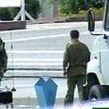
ATTACKS INCREASE IN DAGESTAN, BUT OFFICIALS REMAIN SILENT
Publication: Eurasia Daily Monitor Volume: 2 Issue: 131
By:

Rebel attacks in Dagestan are becoming more frequent and more intense. Early on Saturday, June 25, yet another police car was bombed in Makhachkala. The patrol car was attacked as it passed a gas station on the outskirts of the capital. Barely 15 minutes later, the police group responding to the attack was also bombed. Altogether, six police officers, including a regimental commander, were injured (gazeta.ru, June 25). Later on June 25 rebels derailed a freight train near the town of Khasavyurt, blocking railroad traffic from Dagestan to Chechnya and southern Russia. One day later, a roadside bomb hit another Makhachkala police car.
While the explosions in Dagestan grow louder and louder, the authorities continue to maintain their silence. Neither local nor federal officials have made any comment or statement. Additional special police units were sent to Dagestan in early June to stop such attacks (see EDM, June 23). However, those units have now become rebel targets themselves. July 1 fell on a Friday, the day when Russian soldiers typically go to bathhouses. At noon, as three military trucks loaded with MVD Special Forces arrived at a bathhouse in Makhachkala, a huge explosion ripped through the area. Shrapnel peppered the trucks parked in front of the bathhouse and shredded the canvas coverings. NTV television reports that, out of 60 servicemen, 11 were killed, and more than 15 wounded. A few civilians and bystanders were also hurt (Newsru.com, July 1). The Russian Ministry of Internal Affairs dispatched a team to Dagestan to help local officials in the investigation (Kommersant, July 5).
The bathhouse bombing clearly demonstrated that Russian and local authorities should react to the increasing attacks and at least present some explanations to the Russian public about what is going on in Dagestan. Slowly, some officials have been forced to respond.
On July 4, Dagestani Interior Minister Adalgirei Magomedtagirov finally had to recognize that the Dagestani rebel group Sharia Jamaat had become a very strong organization. The minister admitted, “There is an underground, organized sabotage and terrorist group operating in Makhachkala.” In his words, the group directs its efforts at eliminating people who worked for security agencies, and the police have been unable to respond to the terrorists on an adequate level. Magomedtagirov dismissed Makhachkala’s police chief, along with the heads of three districts of the city. Then he dropped a broad hint that the heads of the traffic police and the economic administration might be next (Kommersant, July 5). After the minister’s comments, the head of Dagestan’s Criminal Investigation Department resigned.
“All these resignations and removals will hardly bring any positive results,” a policeman in Makhachkala told a correspondent from Kommersant. “How can new chiefs work better? One cannot beat the terrorists by quick decisions” (Kommersant, July 5).
Magomedtagirov also ordered the heads of the republican anti-terrorist, organized crime, and criminal investigation departments to “correct the mistakes they had made in their work” by October (gazeta.ru, June 5). Both federal and, especially, local authorities believe that police troops from Russia, as well as special commissions headed by people from the central directorate in Moscow, could improve the situation.
A police building was bombed in Makhachkala the day after the police chiefs resigned. Two policemen were killed and three were wounded, one of them very seriously (News.ru, July 5). According to NTV, the attack occurred during a meeting to discuss measures to fight the rebels.
After the bombing, yet another group of high-ranking officials came from Moscow to Makhachkala. This time it was not a mid-level bureaucrat, but Yuri Kokov, chief of the Organized Crime and Anti-Terrorist Department, and Andrei Novikov, Russia’s first deputy internal affairs minister (regnum.ru, July 6).
The combined federal and local police units launched a wide sweep throughout the city, searching every suspicious house or apartment. On the morning of July 6, a group of policemen were ambushed in a street in the center of the city. Four policemen were injured in the shoot-out, two insurgents killed, three others managed to escape, and one of them was badly injured (Kavkaztsky Uzel, July 6). They commandeered a taxi and ordered the driver to take them to the outskirts of the city, to an area near a mountainous forest. The taxi driver later told police that one of the rebels had an assault rifle, a pistol, and a walkie-talkie that he used to follow the police radio transmissions. He thus knew where to go to avoid clashes with the police (gazeta.ru, July 6).
While the police units searched the city for the gunmen, the insurgents carried out another assault on the northern part of the city. An explosion damaged the pipeline that carries natural gas from Russia to Azerbaijan, temporally interrupting gas exports.
The standoff between the insurgency and the security agencies in the republic continues. Ordinary policemen in Dagestan are very skeptical about the measures taken by the authorities, and many believe that only imposing martial law and a curfew could improve the situation. However, such steps are impossible, as they would clearly demonstrate the failure of the Kremlin’s policy in the Caucasus.
One of the justifications for launching the second Chechen war in 1999 was the need to secure Dagestan from raids by Islamic militants. Imposing a curfew in the capital of Dagestan six years later would admit that the military campaign in Chechnya has been a failure. Nevertheless, effective, immediate steps are necessary; otherwise the Russian government could lose control over the situation in Dagestan in the not-too-distant future.




